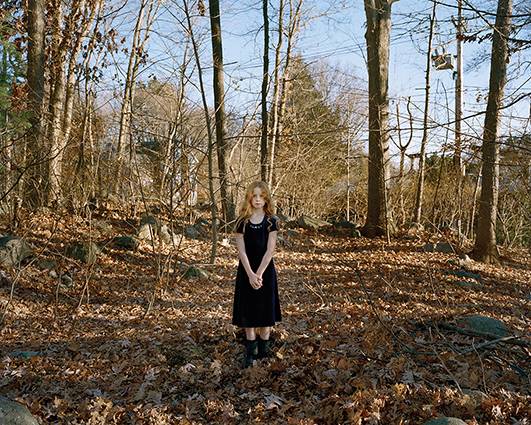
Sensual and sensitive, insolent and indolent, voluptuous and surreptitious: Rania Matar’s lens captures women in all their unapologetic shades. Her muses defy the elapsing time with the delicacy of their gazes, sometimes raw, sometimes elusive. Whether disobedient lolitas, sulphurous artists or ethereal redheads, whether their illusions waltz in a cozy bedroom of Massachusetts or in a makeshift shelter under the bombs, their portraits build fragile bridges between conflicting worlds. In that sense, Rania Matar’s work as a whole could be considered an Unspoken Conversation: between a mother and her daughter; between a model and her reflection; between a child and herself, three years later, when delusions evaporate and only charm tarries.
The convulsive beauties of L’Enfant-Femme seem to taunt conventions with their feverish irreverence. Distraught in a forest of wild trees or from tenuous clumsiness, they get lost and find themselves again in the dawn of their arborescent adolescence. Their bodies are changing, shyly or blatantly; and in this erratic dance, they cling to the fugacious gaze of the photographer and the viewer. Becoming catches up with them a few years later, in their familiar environment: the winding streets or their rooms where they caulk themselves, contemplative and weary. Their ethereal hair grew up but their eyes are now veiled by uncertainty and a languid modesty.
Oscillating between boldness, restraint and melancholy, the Women Coming of Age disarm. Unlike the little girls who use the recent awareness of their raising sensuality to project themselves in space, the older women surrender themselves recklessly to the photographs. Elegant and bittersweet, their maturity has chipped taboos alongside the brittle nail polish on their intertwined hands. Their features are reflected endlessly by their omnipresent mirrors, and also by the faces of their children in Mothers and Daughters. In an astounding intimacy, their distrusting or tender silence whispers all the words they can no longer say out loud.
Rania Matar interweaves individual experiences with a collective voice; becoming the echo of all women who grope on a path between two universes, from puberty to menopause. Their bodies become their canvas of expression and epitomize their desires, their frivolity and their fears. The striking immediacy of the portraits baffles, because each one of them is a lie revealing a deeper truth. The visitor no longer knows whether he is an accomplice, a voyeur or simply a witness of these instants of fleeting grace, already almost vanished. What only remains is the rebellious permission, for a stolen moment, to dream their lives instead of living their dreams.
- Mira Tfaily